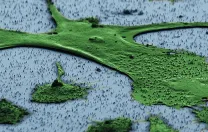The National Institutes of Health's "roadmap for medical research," created in 2004, aims to remove roadblocks to discovery and to "transform the way biomedical research is conducted." One way to do that is to support "high-risk research" through a sort of venture financing, both for "pioneers" (scientists of "exceptional creativity who propose pioneering--and possibly transforming--approaches to major challenges in biomedical and behavioral research") and for "new innovators" (promising younger investigators whose "exceptionally innovative" ideas many not yet meet the hurdle for traditional, peer-reviewed grants).
The 2008 awards, announced last fall, included pioneer funding (up to $500,000 annually for five years) for 16 scientists and new-innovator support (up to $300,000 annually for five years) for 31 more. Nine of the 47 scientists are currently affiliated with Harvard. The neuroscience queries being pursued by Charles Lieber, Hongkun Park, and Aravinthan Samuel are described in depth in the accompanying article. Other pioneer recipients are professor of microbiology and molecular genetics Ann Hochschild, who is studying prions, and Knowles professor of molecular and cellular biology Tom Maniatis, who is using stem-cell-derived neurons to study amyotrophic lateral sclerosis. The new-innovator scientists are assistant professor of cell biology Samara Reck-Peterson, who is exploring the movement of chromosomes during cell division, and other cellular structures; assistant professor of biological chemistry and molecular pharmacology William Shih, who is using nuclear magnetic resonance to probe the structure of membrane proteins; assistant professor of pathology Amy Wagers, who is examining the aging and rejuvenation of stem cells; and instructor in medicine Sean Wu, who focuses on cell-based regeneration of functioning organs. Together, their work (summarized at https://nihroadmap.nih.gov) is a snapshot of research at the frontiers of contemporary biomedical science.






